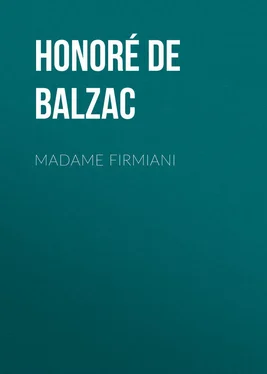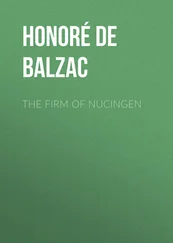Honoré Balzac - Madame Firmiani
Здесь есть возможность читать онлайн «Honoré Balzac - Madame Firmiani» — ознакомительный отрывок электронной книги совершенно бесплатно, а после прочтения отрывка купить полную версию. В некоторых случаях можно слушать аудио, скачать через торрент в формате fb2 и присутствует краткое содержание. Жанр: literature_19, foreign_antique, foreign_prose, на английском языке. Описание произведения, (предисловие) а так же отзывы посетителей доступны на портале библиотеки ЛибКат.
- Название:Madame Firmiani
- Автор:
- Жанр:
- Год:неизвестен
- ISBN:нет данных
- Рейтинг книги:4 / 5. Голосов: 1
-
Избранное:Добавить в избранное
- Отзывы:
-
Ваша оценка:
- 80
- 1
- 2
- 3
- 4
- 5
Madame Firmiani: краткое содержание, описание и аннотация
Предлагаем к чтению аннотацию, описание, краткое содержание или предисловие (зависит от того, что написал сам автор книги «Madame Firmiani»). Если вы не нашли необходимую информацию о книге — напишите в комментариях, мы постараемся отыскать её.
Madame Firmiani — читать онлайн ознакомительный отрывок
Ниже представлен текст книги, разбитый по страницам. Система сохранения места последней прочитанной страницы, позволяет с удобством читать онлайн бесплатно книгу «Madame Firmiani», без необходимости каждый раз заново искать на чём Вы остановились. Поставьте закладку, и сможете в любой момент перейти на страницу, на которой закончили чтение.
Интервал:
Закладка:
Honoré de Balzac
Madame Firmiani
MADAME FIRMIANI
Many tales, either rich in situations or made dramatic by some of the innumerable tricks of chance, carry with them their own particular setting, which can be rendered artistically or simply by those who narrate them, without their subjects losing any, even the least of their charms. But there are some incidents in human experience to which the heart alone is able to give life; there are certain details – shall we call them anatomical? – the delicate touches of which cannot be made to reappear unless by an equally delicate rendering of thought; there are portraits which require the infusion of a soul, and mean nothing unless the subtlest expression of the speaking countenance is given; furthermore, there are things which we know not how to say or do without the aid of secret harmonies which a day, an hour, a fortunate conjunction of celestial signs, or an inward moral tendency may produce.
Such mysterious revelations are imperatively needed in order to tell this simple history, in which we seek to interest those souls that are naturally grave and reflective and find their sustenance in tender emotions. If the writer, like the surgeon beside his dying friend, is filled with a species of reverence for the subject he is handling, should not the reader share in that inexplicable feeling? Is it so difficult to put ourselves in unison with the vague and nervous sadness which casts its gray tints all about us, and is, in fact, a semi-illness, the gentle sufferings of which are often pleasing? If the reader is of those who sometimes think upon the dear ones they have lost, if he is alone, if the day is waning or the night has come, let him read on; otherwise, he should lay aside this book at once. If he has never buried a good old relative, infirm and poor, he will not understand these pages, which to some will seem redolent of musk, to others as colorless and virtuous as those of Florian. In short, the reader must have known the luxury of tears, must have felt the silent pangs of a passing memory, the vision of a dear yet far-off Shade, – memories which bring regret for all that earth has swallowed up, with smiles for vanished joys.
And now, believe that the writer would not, for the wealth of England, steal from poesy a single lie with which to embellish this narrative. The following is a true history, on which you may safely spend the treasures of your sensibility – if you have any.
In these days the French language has as many idioms and represents as many idiosyncracies as there are varieties of men in the great family of France. It is extremely curious and amusing to listen to the different interpretations or versions of the same thing or the same event by the various species which compose the genus Parisian, – “Parisian” is here used merely to generalize our remark.
Therefore, if you should say to an individual of the species Practical, “Do you know Madame Firmiani?” he would present that lady to your mind by the following inventory: “Fine house in the rue du Bac, salons handsomely furnished, good pictures, one hundred thousand francs a year, husband formerly receiver-general of the department of Montenotte.” So saying, the Practical man, rotund and fat and usually dressed in black, will project his lower lip and wrap it over the upper, nodding his head as if to add: “Solid people, those; nothing to be said against them.” Ask no further; Practical men settle everybody’s status by figures, incomes, or solid acres, – a phrase of their lexicon.
Turn to the right, and put the same question to that other man, who belongs to the species Lounger. “Madame Firmiani?” he says; “yes, yes, I know her well; I go to her parties; receives Wednesdays; highly creditable house.” – Madame Firmiani is metamorphosed into a house! but the house is not a pile of stones architecturally superposed, of course not, the word presents in Lounger’s language an indescribable idiom. – Here the Lounger, a spare man with an agreeable smile, a sayer of pretty nothings with more acquired cleverness than native wit, stoops to your ear and adds, with a shrewd glance: “I have never seen Monsieur Firmiani. His social position is that of looking after property in Italy. Madame Firmiani is a Frenchwoman, and spends her money like a Parisian. She has excellent tea. It is one of the few houses where you can amuse yourself; the refreshments are exquisite. It is very difficult to get admitted; therefore, of course, one meets only the best society in her salons.” Here the Lounger takes a pinch of snuff; he inhales it slowly and seems to say: “I go there, but don’t expect me to present you .”
Evidently the Lounger considers that Madame Firmiani keeps a sort of inn, without a sign.
“Why do you want to know Madame Firmiani? Her parties are as dull as the Court itself. What is the good of possessing a mind unless to avoid such salons, where stupid talk and foolish little ballads are the order of the day.” You have questioned a being classed Egotist, a species who would like to keep the universe under lock and key, and let nothing be done without their permission. They are unhappy if others are happy; they forgive nothing but vices, downfalls, frailties, and like none but proteges. Aristocrats by inclination, they make themselves democrats out of spite, preferring to consort with inferiors as equals.
“Oh, Madame Firmiani, my dear fellow! she is one of those adorable women who serve as Nature’s excuse for all the ugly ones she creates. Madame Firmiani is enchanting, and so kind! I wish I were in power and possessed millions that I might – ” (here a whisper). “Shall I present you?” The speaker is a youth of the Student species, known for his boldness among men and his timidity in a boudoir.
“Madame Firmiani?” cries another, twirling his cane. “I’ll tell you what I think of her; she is a woman between thirty and thirty-five; faded complexion, handsome eyes, flat figure, contralto voice worn out, much dressed, rather rouged, charming manners; in short, my dear fellow, the remains of a pretty woman who is still worth the trouble of a passion.” This remark is from the species Fop, who has just breakfasted, doesn’t weigh his words, and is about to mount his horse. At that particular moment Fops are pitiless.
“Magnificent collection of pictures in her house; go and see them by all means,” answers another. “Nothing finer.” You have questioned one of the species Connoisseur. He leaves you to go to Perignon’s or Tripet’s. To him, Madame Firmiani is a collection of painted canvases.
A Woman: “Madame Firmiani? I don’t wish you to visit her.” This remark is rich in meanings. Madame Firmiani! dangerous woman! a siren! dresses well, has taste; gives other women sleepless nights. Your informant belongs to the genus Spiteful.
An Attache to an embassy: “Madame Firmiani? Isn’t she from Antwerp? I saw her ten years ago in Rome; she was very handsome then.” Individuals of the species Attache have a mania for talking in the style of Talleyrand. Their wit is often so refined that the point is imperceptible; they are like billiard-players who avoid hitting the ball with consummate dexterity. These individuals are usually taciturn, and when they talk it is only about Spain, Vienna, Italy, or Petersburg. Names of countries act like springs in their mind; press them, and the ringing of their changes begins.
“That Madame Firmiani sees a great deal of the faubourg Saint-Germain, doesn’t she?” This from a person who desires to belong to the class Distinguished. She gives the “de” to everybody, – to Monsieur Dupin senior, to Monsieur Lafayette; she flings it right and left and humiliates many. This woman spends her life in striving to know and do “the right thing”; but, for her sins, she lives in the Marais, and her husband is a lawyer, – a lawyer before the Royal courts, however.
Читать дальшеИнтервал:
Закладка:
Похожие книги на «Madame Firmiani»
Представляем Вашему вниманию похожие книги на «Madame Firmiani» списком для выбора. Мы отобрали схожую по названию и смыслу литературу в надежде предоставить читателям больше вариантов отыскать новые, интересные, ещё непрочитанные произведения.
Обсуждение, отзывы о книге «Madame Firmiani» и просто собственные мнения читателей. Оставьте ваши комментарии, напишите, что Вы думаете о произведении, его смысле или главных героях. Укажите что конкретно понравилось, а что нет, и почему Вы так считаете.












